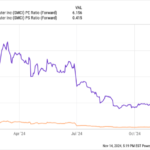Alibaba‘s (NYSE: BABA) stock price experienced a decline of 6% on Feb. 7 after the company, a prominent player in the Chinese e-commerce and cloud industry, posted its latest earnings report. For the third quarter of fiscal 2024, which ended on Dec. 31, its revenue rose 5% year over year to 260.35 billion yuan ($36.67 billion) and beat analysts’ estimates by $270 million. Its adjusted earnings per ADS dipped 2% to $2.67 but cleared the consensus forecast by $0.03 per share.
The company’s headline numbers weren’t disastrous, but it continues to face challenges in revitalizing its core e-commerce and cloud businesses. However, at 10 times next year’s earnings, its stock appears to be trading at a significant discount, just 8% above its IPO price, presenting a bold investment opportunity to those taking a contrarian view.

Image source: Getty Images.
Assessing Alibaba’s Recent Performance
When Alibaba’s stock reached its all-time high in October 2020, its Chinese e-commerce marketplaces (Taobao and Tmall) and cloud platform were thriving. From fiscal 2015 to fiscal 2020, its revenue saw a compound annual growth rate (CAGR) of 46% and net income grew at a CAGR of 42%.
In fiscal 2021, Alibaba’s revenue climbed 41%, but its net income only rose by 2% after the company faced a record $2.75 billion fine from China’s antitrust regulators. The regulators also imposed restrictions on Alibaba’s e-commerce marketplaces and its business operations, contributing to restrained growth.
Competition from companies like PDD and JD.com, along with macroeconomic headwinds, drove Alibaba to expand its overseas e-commerce marketplaces. Additionally, its cloud segment was challenged by macroeconomic conditions and stiff competition, further impacting the company’s overall performance.
Anticipating Alibaba’s Future Trajectory
In response to these challenges, Alibaba restructured itself into six new units, implemented cost-cutting measures, and focused on expanding its higher-growth segments. Despite these efforts, its core businesses continued to face difficulties. The table below illustrates the revenue growth by segment for recent quarters:
Revenue Growth by Segment (YOY) | Q1 2024 | Q2 2024 | Q3 2024 |
|---|
Data source: Alibaba. YOY = year over year. RMB terms.
Taobao and Tmall, the major contributors to revenue, experienced sluggish growth. Alibaba’s Cloud Intelligence segment also expanded at a slow pace. Despite the rapid growth of its International Digital Commerce business, it remained unprofitable, and other segments such as Local Services and Digital Media continued to face challenges.
Evaluating Alibaba’s Potential for Investor Gains
Alibaba’s profitable segments need to drive growth to subsidize the expansion of its unprofitable businesses. However, economic challenges and intense competition may hinder the company’s near-term recovery. Alibaba also signaled potential limitations in boosting revenue through investments or acquisitions, demonstrated by its recent expansion of the buyback plan by $25 billion.
To turn a $10,000 investment into $1 million over the next 20 years, Alibaba would need to increase its revenue and earnings at a CAGR of 26%. Given the current macro, regulatory, and competitive challenges, achieving such growth rates seems increasingly implausible, further complicating the investment thesis.
The Future of Alibaba Group: A Cautionary Tale for Investors
Alibaba Group’s rocky road recently has made investors uneasy. With market share shrinking, Pinduoduo gaining steam in China’s e-commerce sector, and ongoing regulatory challenges, it seems the company’s turmoil is far from over.
Stability Marred by Challenges
Despite its stable growth rates, Alibaba Group faces challenges, reflected in its market share loss. As an iconic symbol of China’s tech sector, its precipitous fall has startled investors. Furthermore, with an increase in net income at a CAGR of 27%, the company has struggled to keep its place in the Chinese e-commerce landscape, symbolizing a volatile climate.
Pinduoduo’s Ascent and Potentially Higher Returns
While Alibaba’s future remains uncertain, Pinduoduo has emerged as a formidable rival in the Chinese e-commerce landscape and gained attention for its potential to yield higher returns. Investors seeking a Chinese e-commerce company with higher growth potential should examine Pinduoduo instead of betting on Alibaba’s recovery.
Investing Considerations
Before making any investment decisions, it is prudent to evaluate both the opportunities and risks associated with Alibaba Group. The Motley Fool Stock Advisor analyst team did not include Alibaba Group in their list of the 10 best stocks for investors to buy now, indicating that there may be better investment options available. Additionally, considering the historical performance of the Stock Advisor service, it may be worth exploring alternatives that have shown potential for robust returns.
It is important to conduct thorough research and carefully consider all available information before deciding whether or not to invest in Alibaba Group. In the fast-evolving landscape of the Chinese tech sector, prudence should reign supreme.
Stock Advisor provides investors with an easy-to-follow blueprint for success, including guidance on portfolio building, regular updates from analysts, and two new stock picks each month. Since 2002, the Stock Advisor service has significantly outperformed the S&P 500*, making it an appealing resource for investors seeking solid investment guidance.
Investors should approach potential investments with caution, given the unpredictable nature of the stock market. It is always advisable to stay informed and seek guidance from reliable sources before making any investment decisions.
*Stock Advisor returns as of February 6, 2024
Leo Sun has no position in any of the stocks mentioned. The Motley Fool has positions in and recommends Baidu, JD.com, and Tencent. The Motley Fool recommends Alibaba Group. The Motley Fool has a disclosure policy.





